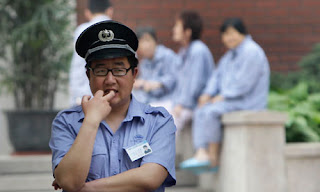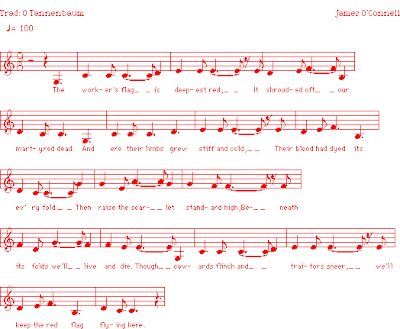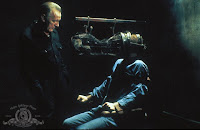'Can I see your identity card?'
It’s not really the sentence you want to hear from a security
guard, particularly when the only available answer is ‘no’. My first evening in
Hong Kong, and I was surfing on a wave of slightly manic energy. The game is to
force your body to pretend that it really does believe that it’s 6pm, in spite
of the day either being 5 hours long or 29 hours long, depending whether you
considered that scant 4 hours of sleep to be an uncomfortable siesta or an
overnight fractured sleep.
 |
Trials for the new Economy Class
'Lard Arse' seat were going well |
It’s after 6 to 8 hours in the same seat, with someone
else’s chair pushed into your face and the disconcerting light from distant LCD
screens, that your arse bones really start to complain. A fear of deep vein
thrombosis is replaced by the casual concern that bedsores might be a
possibility. Air New Zealand has many things to commend it, but a choice of
movies in which ‘The Hopes & Dreams of Gazza Snell’ is first on the list of ‘classics’
is not one to brighten the spirit and have Barry Norman reaching for his quill.
Apparently, there was a grand piano on the Hindenburg. Now that’s in
flight entertainment. I bet that went down like a house on fire.
 |
| Insomniacs rejoice! |
Anyway, back to the identity card. I was in the shopping area and was
looking around, reacquainting myself with its singular charms, when I was
approached by two policemen. The conversation, almost Wildean in its coruscating
energy, went like this;
Policeman 1: Can I see your identity card?
Me (our noble hero, fighting against the brutality of the police state):
No, my passport is in my hotel room.
Policeman 2: Can I see your identity card?
Me (aha! They won’t fool me, playing this good cop / bad cop interrogation
technique): No, it’s in my hotel room.
Policeman 1: Can I see your identity card?
Me (this one’s for the people. Rise up! Rise up! You have nothing to lose
but your chains!): (looking through pockets, rifling through wallet) I’ve got
my credit card and my hotel pass…
Policeman 2: You don’t have your identity card?
Now at this point two things fluttered through my mind.
1. No wonder
Chinese police are feared worldwide for their Poirot-esque intuition and deep
understanding of the criminal mentality
2. Was I
about to be dropped into a Kafkaesque world of lost identity and bureaucratic
entanglement by my two Sino Centurions?
Policeman 1: You come with me
 |
| Stony-eyed defender of the state |
And off he scuttled, I knew not where. I could have made a run for it,
but I was wearing flip flops, and I didn’t feel it would be terribly
sophisticated to be arrested in flip flops. If I’m going down, I’m going down
in Dune, I assure you.
He looked back, and barked again. ‘You come with me’, and I followed. I
was determined not to travel at his scuttling pace and deliberately affected an
English stroll, as perfected by years of colonialism. Every ten paces he would
look back, fretting at my ‘oh look, a butterfly’ disinterest. This is how the
proletariat fights back against the granite-faced carborundal oppressors of the
state... This was I, standing shoulder to shoulder with Marx, Guevara and Ricky
Tomlinson. I was half way through the Red Flag already… ‘The people’s flag is deepest red…’ I began, then remembered I was
in a communist state. I didn’t want to look like a lickspittle lackey of the
totalitarianists.
 |
| There are another six verses of this, you know... |
Up two flights of stairs and along a corridor, we came upon the police
offices. An officer sat behind a desk. Policeman 1 ululated at him in
Cantonese. He addressed a question to me, one probably embedded deep within the
masonry of the building, probably one the desk itself could have voiced.
Policeman 3: Can I see your identity card?
I confess I was starting to find this funny, although the possible outcomes
worried me. I was taken to another, smaller room and asked the same question,
this time by three police officers. But then, just as the tale started to lose
its dramatic narrative, there was a twist;
Policeman 5: What is the number on your identity card?
Me: I don’t know
Policeman 5: Why not?
Me: (slightly baffled) Because we don’t need them in the UK.
Ha! Take that, Pol Pot! It’s Winston Smith standing up
against O’Brien! Orwell would be proud.
 |
| This is how it was. Honestly. |
Policeman 6: Is this your identity card?
And they showed me the identity card of a man with whom I
had only two things in common. I was Gwailo – white (literally, a ghost
person), and I was bald. Nothing else linked us beyond our gender. He was fat,
had glasses, and was younger than I. I laughed, told them it was somebody
else’s identity card, and pointed to where my glasses should be. I got out my
credit cards and pointed out the different name. I didn’t quite go so far as to
point out the meso- as opposed to the endomorphic comparisons of our corporeal
stature, but I was tempted.
 |
| How I look to a Chinese policeman |
 |
| How I look to me |
I said something along the lines if ‘is it because I is bald?’,
and Policeman 1 laughed.
Policeman 6 laughed. Policeman 5 laughed. Policeman 1
apologised profusely. I was led out to the outer office where Policeman 3, once
the situation had been explained, laughed along. We were all becoming best
friends and Policeman 1 was still apologising. On arrival downstairs, Policeman
2 found considerable amusement in the account.
So we ended the whole farrago as bosom pals and by having
added to the total sum of hilarity in the world.
But that’s not how it seemed at the start. And I’m only
sorry I didn’t manage to fart in their office as a final act of defiance
against the police state.
‘Though cowards flinch
and traitors sneer, We’ll keep the red flag flying here…’






